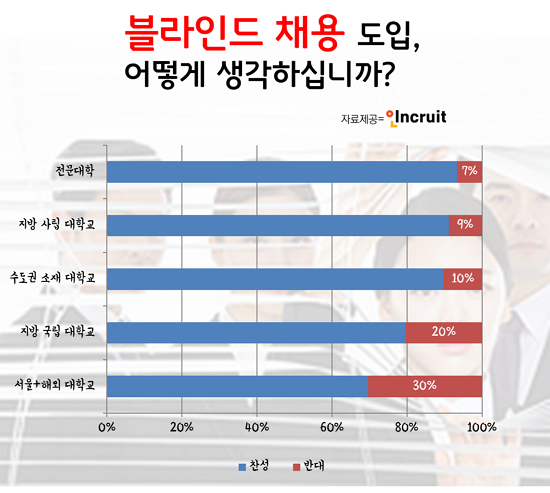 |
The new president is creating new policies in various areas. For the youth, various job policies, with the slogan ‘Opening of an Era of Zero-Irregular Jobs’, are being suggested. Of these, the most noticeable is the ‘Blind Recruitment’ policy. Blind recruitment is a method of selecting talented people according to job and aptitude based on resumes that do not reveal home environment, education, family relations, etc. People are expecting that the unnecessary construction of ‘Specs’ will be reduced and employers will be restricted for hiring based on prejudices. However, there are also voices of concern about the Blind Recruitment.
Why Did Blind Recruitment Occur?
The first reason for blind recruitment is the unfairness of recruitment. A survey of 534 job seekers from an employment portal survey found that 76.6% of respondents believed 'I have felt that hiring was unfair'. The reasons for this unfairness were ‘I see a job announcement that seems to have a presidential candidate’ and 'working conditions are unclear on the job announcement' (44.3% of respondents). In addition, there were ‘questions asked to specific applicants in interviews’ (36.4%), ‘acceptance of a person who has lower specifications than me’ (25.9%), and ‘rumors of preferences for applicants with certain conditions’ (19.6%). In a survey of 579 people in their 20s, 75% of respondents answered that they have received inappropriate treatment during their job search. Thus, it appears that unfair recruitment practices, such as 'recruitment of parachutes' as well as discrimination against education, age, etc., has been taking place.
Many young people believe there is an ’intern caste system’ in place. The term “intern caste system” is a satirical stab at those jobs that feel unfair in a serious employment crisis. Nowadays, internship job positions exist in various forms but are only available for those who come from affluent ‘gold-tern (gold+intern)’ families. In some cases, the term ‘back (personal connections)’ is needed. Internships offered by many public enterprises, major companies, famous law firms, and a member of the National Assembly are representative ‘goldtern’ positions. ‘Goldtern’ positions offer a low workload where part of the working time can be used for self-development. ‘Silver-tern’ internships have a moderate workload for a moderate pay for labor. It is public interns who are openly hired. The lowest level of internship is the ‘dirt-tern’, which is given a ‘passionate pay’ less than the minimum wage while maintaining a solid workload.
The Start of ‘Blind Recruitment’
The president ordered, on June 22, that public officials and public sector workers be hired blind from the second half of this year.. He said, “All recruitment should commence from the same starting line of ability, except when positions require a certain degree of academic ability, specification, or physical condition.” He also emphasized that “private large corporations also apply blind recruitment as it has been proved that blind recruitment can select excellent and enthusiastic talents.” The government is planning to distribute the Corporate Blind Recruitment Guidebook to private companies, which stipulates the content of all the recruitment procedures, such as the recruitment announcement - application form – written test/interview process. In addition, the government plans to support consultants and HR managers (about 1,000 people) for small- and medium-sized enterprises (about 400) who want to introduce the system within the year. It is expected to expand to private companies from next year as there will be an announcement of the results of the inspection and improvements in the recruitment practices, in the second half of this year.
According to the Federation of Korean Industries, the four major groups have been using blind recruitment since 2015 and deleted or simplified personal information, such as credits, linguistic grade, certification, etc. If such blind recruitment is adopted in private companies, it is expected that adoption of four groups will be implemented as the model.
In the latter half of 2015, Samsung abolished the grade limit (more than 3.0 out of 4.5). And they are evaluating an applicant’s ability and logic development process by introducing a creativity interview. In Hyundai, clubs, volunteer activities, and academic activities have been eliminated since 2015. Since 2015, the SK Group has removed photos, language grades, IT literacy, overseas experience, and family relationships and is now focusing on the cover letter. The LG Group is also hiring with a focus on the ability of applicants by greatly reducing the section on personal information.
 |
Job-Korea recently (July 2017) surveyed 418 personnel in charge of ‘blind recruitment’ and 80.9% respondents approved of this policy. Also, 82.5% of respondents answered that they agree with the government’s intention to implement blind recruitment. 53.6% of HR managers who agree with the adoption of blind recruitment said, “I think who selected by their ‘specs’ have no different in work site”. The SK group has been organizing the 'Intern Viking Challenge', which selects interns without any personal information. An SK representative said, “Interns selected at the Intern Viking Challenge will be transferred to a permanent position after two months of a competency evaluation." About 40% of the total number has been converted into permanent positions. The background of this recruitment is the internal opinion that large corporations should lead the way in positive change by reducing the social cost due to specs and education. Also, the SK representative said, “Our company has been able to select talent from a wider perspective because we thought that it has no correlation between high specs and job capability.”
What About the Response of Applicants?
Job-Korea surveyed 997 students of which 82.2% were in favor of blind recruitment. Job-Korea reported that the respondents had a lower level of education, had a higher rate of approval, while the percentage of high school graduate respondents was 91.0%. The figure stood at 89.1% for students in 2 or 3 year colleges. Nearly half of respondents (48.4%) predicted that blind recruitment would be beneficial to their employment.
 |
However, there are also students who oppose blind recruitment. According to 404 young applicants, three out of ten university students from Seoul and overseas universities replied that they did not sympathize with the intention of blind recruitment. Only 65% of students from universities in Seoul and overseas answered they agree with the policy compared to 80% of students at provincial universities. Also, when asked about the pros and cons of the policy, the opposition rate of those from Seoul and overseas universities was the highest at 30%. Students in Seoul argue they have achieved their positions through hard work and it is unfair not to evaluate job applicants on this basis.
Concerns About Blind Recruitment
There is a concern that youth may spend too much time on career management, and this will have adverse effects. Son Dong-hyun, vice-president of Daejeon Univ., said, “Many students will devote their time to career management instead worrying about their future.” As blind recruitment focuses on ‘talent and story (my own story)’, one such adverse effect would be more and more applicants looking for private tutoring. Thus, anxiety levels will rise as students flock to academies to bolster their talents and stories. In a recent survey of 283 job applicants, 31.8% of the respondents had received job tutoring, employment consulting (35.6%) and job-related professional education (34.4%), such as simulated job interviews or improved cover letters. Especially, professors are most worried about the regulations that prohibit university credits being mentioned in blind recruitment. Professor Lee Duk-hwan, who predicted that the administrative and educational sectors would collapse due to blind recruitment, said, “It can give the wrong idea to students that they do not need to study.”
Also, there may be a reverse discrimination due to overlapping with the local recruitment quota system. A ‘local recruitment quota system’ states that a certain number of new employees must be sourced from the local area. Such a quota can lead to the exclusion of more talented applicants. For example, KOGAS, which transferred its headquarters to Daegu, allocated six places (out of 41 for the first half of this year) to local talent from Daegu and Gyeongbuk. This was two percentage points higher than last year. However, KOGAS operates the nation's largest hazardous facilities in Incheon but does classify Incheon locals as local talents. In case of KOGAS, if an applicant comes from a university in the capital area, even a native of Daegu does not qualify as a local talent. It seems that this is not a preference for local talent, but rather an exclusion from a capital region university.
On the contrary, the Incheon International Airport Corporation and Incheon Port Authority have its headquarters in Incheon but there is no preference for graduates from the capital area. When the Incheon International Airport Corporation recruited 35% of its intake of new employees from graduates from non-metropolitan provincial universities, in the first half of this year, this seemed to be reverse discrimination aimed at capital university students. Professor of Sociology at Sungkyunkwan University, Woo Jung Woo, said, “Blind recruitment and the local quota system can take away the job options of students who have worked so hard to go to a good college.” He added, “The government must implement a policy of equal opportunity first.”
We all agree with the fundamental intention of ‘blind recruitment’, the goal of ‘preventing jobseekers being unfairly injured’. For the success of blind recruitment, it is necessary to make specific plans to select talent without discrimination. Students will have to create their own story as part of their preparations for blind recruitment, which may be conducted from next year by a private company. However, it is very important to understand the contents of blind recruitment and to make sure that you will not be harmed.
최유민 sq02248@gmail.com
<저작권자 © 인하프레스, 무단 전재 및 재배포 금지>

![[보도] 제43대 총학생회 후보자 공청회 개최돼](/news/photo/202404/11686_5015_2626.png) [보도] 제43대 총학생회 후보자 공청회 개최돼
[보도] 제43대 총학생회 후보자 공청회 개최돼
![[보도] 제43대 총학생회 후보자 공청회 개최돼](/news/thumbnail/202404/11686_5015_2626_v150.jpg)
![[보도] 총학생회장 선거 열려···학생사회 대표자는?](/news/thumbnail/202403/11668_5014_266_v150.jpg)
![[보도] 무전공·계열제 논의···학생은 어디에?](/news/thumbnail/202403/11666_5011_2238_v150.jpg)
![[보도] 인하 70돌, 다양한 행사 이어져](/news/thumbnail/202403/11663_5009_165_v150.jpg)
